In the wake of COVID-19, many self-proclaimed gurus seem to know exactly where the future is headed, and where fool-proof opportunities lie.
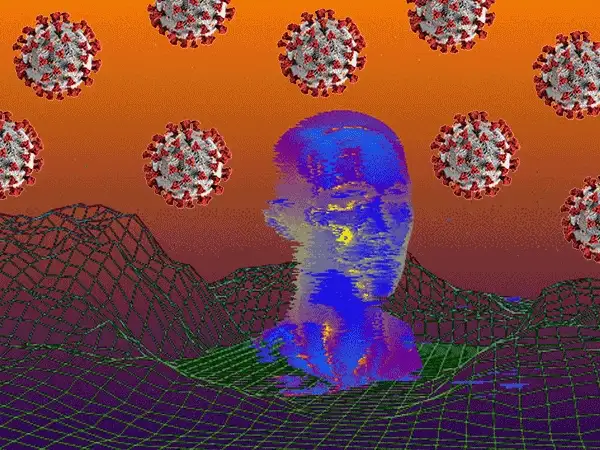
The truth is less sexy: This is a time of near-universal uncertainty. Nobody can authoritatively declare what the coming years, months, or even days have in store. Society, culture, and business are in a state of flux.
Many of us have turned to the opinions of virologists, PhDs, and analysts to explain the challenges we face in the present. But who can help us better understand the possible future implications of this crisis?
One answer: futurists — professionals in a variety of fields who, through rigorous analysis and research, make projections about what the world might look like someday. Futurists are not prophets. But as expert forward-thinkers, they offer a unique perspective on navigating uncertainty.
The Hustle recently spoke to a number of prominent futurists, focusing on how COVID-19 might impact various sectors in the short- and long-term. A few takeaways:
- A hitch in global trade could inspire a localism movement in various sectors like tourism, shipping, and production.
- We might see an uptick in 3-D printing and other self-sufficiency tools.
- The crisis could accelerate the intersection of AI and biology.
- Educational content on immersive platforms (VR, MR, XR) is poised for growth.
In this post, we’ve published excerpts from 4 of these interviews, lightly edited for clarity and length. The full interviews — along with other supplemental material highlighting how to position yourself in a time of crisis — are available on Trends.co, our premium-subscription service.
You can access that material with a $1 Trends trial.
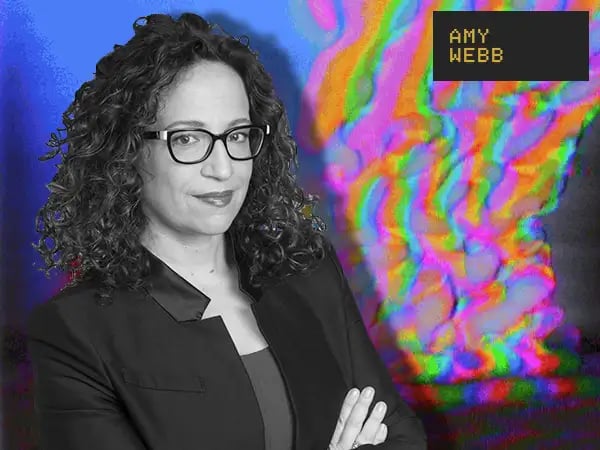
Amy Webb is a quantitative futurist, author, and professor of strategic foresight at the NYU Stern School of Business. She is also the founder of Future Today Institute, a foresight and strategy firm.
What is your job as a futurist?
A futurist is somebody who confronts and reduces deep uncertainty, using (in my case) data and modeling.
We use a framework called a time cone, which accounts for uncertainty over longer periods. In the very near term (today), you’ll have the most data and certainty you’ll ever have. But the further out into the future you go, the less data — and certainty — you’ll have. There are fewer inputs. But that doesn’t mean you can’t make certain decisions.
Then, we have these 4 different time horizons that we define right at the beginning of every project: Tactics, strategy, vision, and systems-level evolution. We start from there.
My job is not to make predictions. That’s one of the biggest misconceptions of what a futurist does. You can make a prediction if you have a discrete data set; otherwise, you’re just speculating.
Based on the data and trends you’ve analyzed, and in light of COVID-19, which industries might struggle in the coming years?
What I do is management consulting and strategic analysis. I can tell you based on data and analysis which industries will have trouble moving forward. But again, this is based on what evidence-based modeling tells us — not just what’s been heard or read.
We’re going to see consolidation across a lot of industries. Hospitality and airlines are particularly problematic.
Entertainment — especially studios and production — is in a bad spot. The current US business model for entertainment is predicated on live, unscripted entertainment [i.e., reality shows]. They are significantly less expensive to produce. These shows require bringing people together in close spaces. Without the unscripted shows, the financial models for some of our entertainment companies won’t make sense in the near term.
And based on that same modeling, where is there acceleration?
The intersection of AI and biology — specifically, virology and synthetic biology — is a big one. For example, AI is being applied to speed up scientific discovery. People might say, “Well yes, isn’t that already what was happening?” And the answer is, not entirely. We’ll also see more investment in supercomputers.
A lot of the big tech companies are already investing heavily in healthcare and biomedical tools. That will accelerate during the virus, in part because regulatory changes will drive things like home-based diagnostics.
What should entrepreneurs be focusing on right now to make the world a better place in the coming months/years?
Catastrophe is a catalyst for change.
What I would do if I were an entrepreneur right now is look for areas of distress — people or businesses that need something, or places where there is existential risk. Then, I’d figure out what the next-order implications of that risk are. Figure out how to mitigate that risk and solve a future problem today.
Just as an example, it’s highly unlikely that anybody is going to go back to a movie theater and have a great experience any time soon. The reason for that is liability. If you’re a movie theater chain and allow people to sit next to each other without signing waivers and someone gets sick, you’re going to get sued.
If theaters open, how should they facilitate people watching a movie? If you don’t serve concessions and people have to sit 6 feet apart, the business model doesn’t work out.
If I were an entrepreneur, I’d relaunch a modern drive-in theater that takes advantage of digital tools and services and meets the needs of consumers today. There are distressed drive-in theaters all over the country. That’s the kind of thing where you’re able to make a future market.
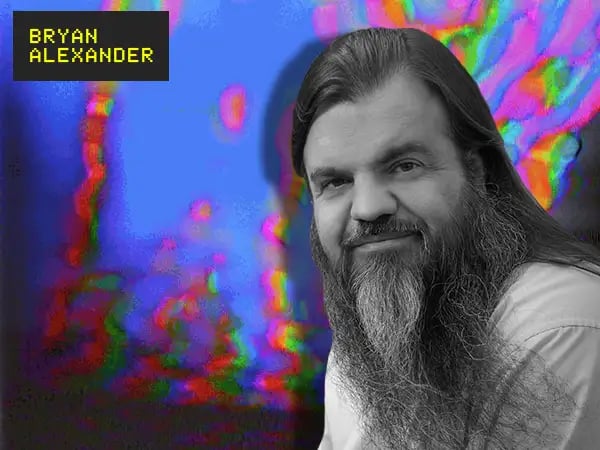
Bryan Alexander is a futurist, author, and researcher focused on how technology transforms education. He is currently a senior scholar at Georgetown University.
What’s one COVID-related change that you think nobody sees coming at this point but might be inevitable in the long term?
It’s possible that it’s going to throw a wrench into globalization, and that [global trade] will either skew sideways or slow down. There is a building Cold War between the US and China. The politics of both nations are strongly nationalistic and that can turn towards protectionism pretty easily.
The US and China are economically intertwined with each other. So, that could really shut things down and ripple out in all kinds of industries — tourism, air travel, shipping, supply chains, production. Apple is already trying to yank something like 20% of its production out of China. That’s huge.
That could boost technologies that give us the ability to produce things locally, like 3D printing. If we get to the point where we can just sit down and print out toys, tools, models, and pieces of instruments that we’d normally have shipped to the US across the Pacific, that could slow globalization down in some very interesting ways.
You specialize in thinking about the future of education. Are there industries that don’t exist today that you think might emerge from this? Where are the opportunities for growth?
First, I think the whole production side of VR is about to really take off. Most attention has been focused on the hardware.
Immersive content for VR — or XR, or MR, or whatever you want to call it — is still pretty thin on the ground. It’s hard to make and takes a lot of media assets. But there is room for more educational content on these platforms and tools for using it.
The second thing is that I think we’ll see a major push forward in the private space industry. Now that Musk and Bezos are leading the way, the US government is really just going to be a consumer moving forward. I think you’ll see a lot more people competing in that space, taking advantage of everything from asteroid and lunar mining to tourism.
If you were an entrepreneur starting a business now, what would it be?
I’d think about a business that helps people in contingent labor. So anything from, say, a tool that could help people in the gig economy find resources and jobs, to something that helps people manage the gig economy.
I would also look into anything involving climate change. It could be anything from businesses that are based on helping modernize the electrical grid, to alternative energy, to educational resources around the Anthropocene, to social entrepreneurship about trying to organize people’s activity. That’s a huge field that has barely been tapped into.
There’s also an opportunity in figuring out how to make digital infrastructure work.
We have a terrible digital divide in the country, and COVID-19 has really revealed it. That applies to broadband connectivity. It’s happening with 5G. There are parts of the country that are not at 2G yet. Any enterprise that could help address that would be really brilliant.
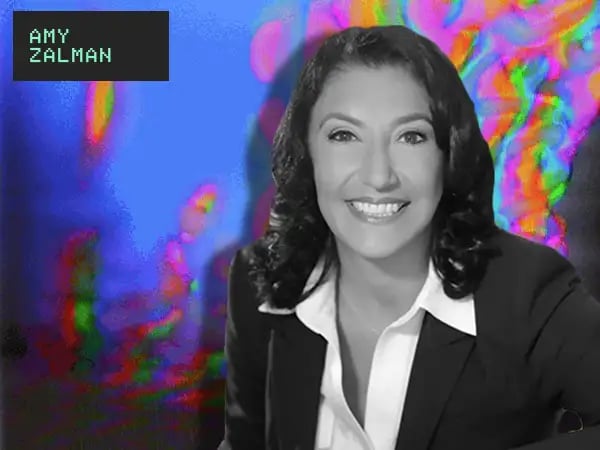
Amy Zalman is a global futurist who helps leaders and organizations prepare for transformative change. She is a professor of strategic foresight at Georgetown University and the CEO of the foresight consultancy Prescient.
Where do you think the unseen opportunities are, post-COVID-19?
Opportunity generally is somewhere at the intersection of where nobody else is looking and change.
I think that virtual reality will get a boost from online platforms. Creative thinking around hybrid opportunities for meeting, and anything that starts with “tele” — telemedicine and the like.
I also wonder how attitudes toward cash might change. If people are afraid of cash as an object that might transmit germs, cryptocurrencies could [see a boost].
The World Health Organization says that cash is not a “good” carrier of coronavirus, so we shouldn’t be afraid of it. But nevertheless, people are increasingly exchanging items in ways that are not cash-based.
Which industries do you think this crisis will affect the most in the long term?
Whole categories will be redefined in new terms. That, to me, is where the opportunity lies.
I think governments that were already under pressure — if you want to consider that a version of business — is a place to be interested in. I’m very interested in the way in which this will give a boost to localism. With the challenges small businesses are facing, there’s an undercurrent of wanting, or needing, to be local. There is an opportunity for tourism to revive itself in a local sense.
[Another] space I’m interested in is the legal industry. Courts and law might be pushed into innovations that they really were not ready to consider. Things like Supreme Court hearing arguments by telephone, hearings being held via Zoom, the recognition that you may not need to have notaries and signatures, and can actually move documents much more quickly along the line.
Law and the legal world typically move very slowly and conservatively. And they’ve just been shoved into a world that they weren’t ready for.
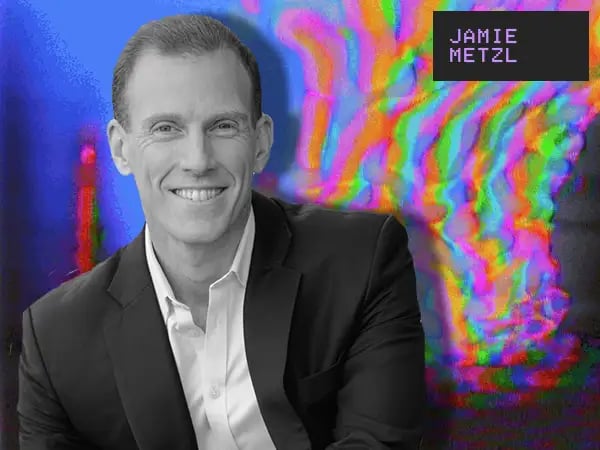
Jamie Metzl is a technology and healthcare futurist, a faculty member at Singularity University, and the founder of OneShared.World, an organization working toward global unity.
What’s one innovation that will become more important post-COVID-19?
The answer to that is global communications.
We talk about artificial intelligence changing everything, and maybe someday it will. But the technology that is really bringing us together is this raft of communication technologies that allow us to collaborate in ways that defy geographies.
A century ago, we couldn’t have built a global movement in 5 weeks. It would have taken 5 weeks just to send a letter and get a response.
Now, we’re living in this incredible moment where we have 7.7B humans on Earth and an 85% literacy rate. We have 6.5B literate humans, connected with these incredible networks where many people have access to all the knowledge in the world to collaborate with each other.
We have these unbelievably powerful tools that are a result of this superconvergence of all of our technologies. But these technologies don’t come with their own built-in value system. People can use all of these technologies to do good things that help people and bad things that hurt people.
The greatest challenge of this moment isn’t just to defeat the pandemic. It’s to define the values that will guide us through this and everything else.
What industries exist today that you think are going to no longer exist 10 years from now?
Well, certainly commercial real estate is going to take a big hit in most places.
The virtualization that we’re seeing is not going to snap back, so there’s going to be a lot of excess capacity. That is going to filter through all of the entities that are connected to commercial real estate — the mortgage lenders and everybody else — and the problem that we face is that when we have a single industry that hits a rough patch, the government can bail them out.
But the government can’t bail out all of the industries for 4 years. So I certainly think that we will always need commercial real estate. But that’s just a very obvious industry that’s going to suffer.
I also certainly hope that this whole industry of people getting famous by taking pictures of lasagna and posting it on social media goes away. We’re realizing that life is serious business. We need frivolity. But there are some really big problems and we need to come together to address them in the spirit of our humanity.
So, commercial real estate and lasagna on social media.
→ You can read our full series of futurist Q+As on Trends.co by signing up for a $1 trial here.
